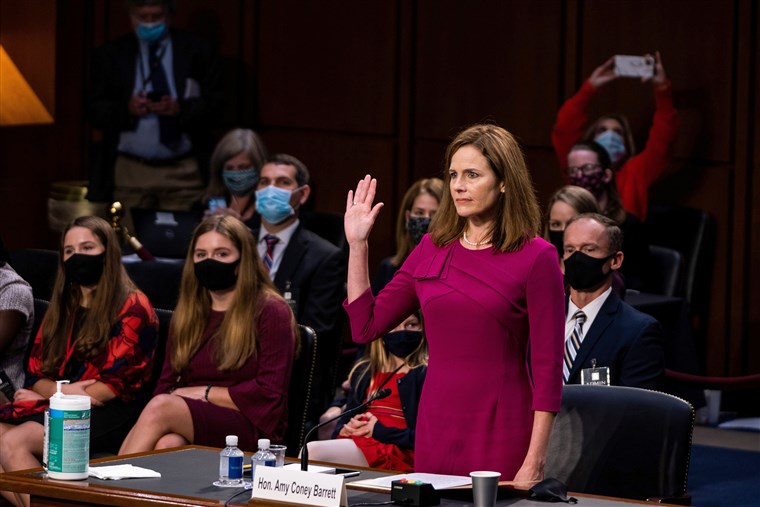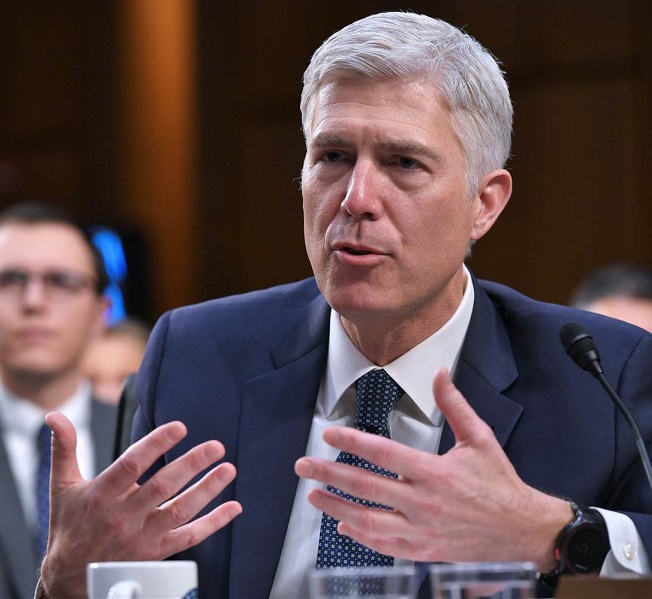We Explain the Reasons for Each of the Justices' 89 Recusals So Far This Term
By Amanda Pescovitz, FTC law clerk
Each year, and sometimes twice a year, Fix the Court tries to explain each of the justices’ cert.-stage recusals in an effort to shed some light on the Supreme Court’s conflicts of interest.
Since the justices don’t explain their 150-200 annual step-asides[1], we do it for them.
 What’s new this year is that we’re showing our work. It’s often unclear why justices are recusing, and the process by which we uncover their reasoning is often arduous, so for the first time, in columns E and G of our OT 20 recusals list, I describe below and in this report the process by which we got to our result – whether “previous work,” “stock ownership,” “family/personal ties” or other reason.
What’s new this year is that we’re showing our work. It’s often unclear why justices are recusing, and the process by which we uncover their reasoning is often arduous, so for the first time, in columns E and G of our OT 20 recusals list, I describe below and in this report the process by which we got to our result – whether “previous work,” “stock ownership,” “family/personal ties” or other reason.
So far this term, Supreme Court justices have self-disqualified 89 times, in 85 cert.-stage petitions that were denied, in three per curiam opinions and in one petition that was granted and will be argued during the January sitting.
That’s up from 69 recusals at this time last year. We attribute the increase to two factors. First, the new justice: Justice Barrett recused from three per curiam opinions whose results were presumably reached before confirmation, though she was on the court when they were released, and she recused from three election petitions that, according to the court, she did not “have time” to review. Second, SCOTUS received more petitions than normal from vexatious litigants who named justices in their filings. A broader discussion is below:
Recusals Caused by a Justice Not Yet Being on the Court (6)
This fall saw the addition of a new justice to the court and an accompanying raft of recusals. Aside from her blanket recusals from the Nov. 2 orders list, which we did not include in the numbers per our custom[2], Justice Barrett had noted recusals from three election-related cases that came out just days after she joined the court on October 27: 20A71, Wise v. Circosta et al.; 20-542, Republican Party of Pennsylvania v. Boockvar, et al.; 20A74, Berger et al. v. North Carolina Board of Elections, et al. The court’s Public Information Office explained that she had not yet had time to review the filings to participate in those cases.
Three orders from the Nov. 2 list drew written statements from the justices, making the newest justice’s recusal more notable: two per curiam opinions, 19-1108, McKesson v. Doe, involving personal liability for protest organizers for injuries incurred by third parties; 19-1261, Taylor v. Riojas, et al., involving the application of the doctrine of qualified immunity; and a cert. denial in 19-1098, National Football League, et al. v. Ninth Inning, Inc., et al.
Recusals Caused by Stock Ownership (9)
Nine times so far this term Justice Alito has recused due to owning stock in a company. Though three justices – Chief Justice Roberts and Justices Breyer and Alito – have not divested from individual stocks, Alito’s portfolio is by far the largest, leading him to sit out in a handful of cases.
 A stock-based recusal is the only merits stage recusal so far this term. Alito will sit out of 19-1189, BP P.L.C., et al. v. Mayor and City Council of Baltimore, which the court will hear on Jan. 19, due to his ownership of stock in Phillips 66 and ConocoPhillips, both “et al.” litigants. An eight-justice court will consider a procedural issue in the city’s climate change lawsuit against oil and gas companies – though we think it should be seven, as Justice Barrett included Shell, another “et al.,” on her Sept. 2020 Seventh Circuit recusal list, and though her position has changed since the fall, her bias probably hasn’t.
A stock-based recusal is the only merits stage recusal so far this term. Alito will sit out of 19-1189, BP P.L.C., et al. v. Mayor and City Council of Baltimore, which the court will hear on Jan. 19, due to his ownership of stock in Phillips 66 and ConocoPhillips, both “et al.” litigants. An eight-justice court will consider a procedural issue in the city’s climate change lawsuit against oil and gas companies – though we think it should be seven, as Justice Barrett included Shell, another “et al.,” on her Sept. 2020 Seventh Circuit recusal list, and though her position has changed since the fall, her bias probably hasn’t.
At the cert. stage, Alito’s stock holdings have led to his recusal in seven unique cases. He has recused in two cases involving Boeing: 20-98, Wood v. Boeing Co., and 20-259, Nguyen v. Boeing Co.; and two cases involving ConocoPhillips: 20-265, Ramirez, et. al v. ConocoPhillips Co., et al., and 20-638, Gonzales v. ConocoPhillips Co., et al.
He recused from considering 20-5094, Laux v. Mentor Worldwide, LLC, as well as the petition for rehearing due to his ownership of stock in Johnson & Johnson, Mentor’s parent company. His ownership of PNC Bank stock disqualified him from 20-154, Byzon v. PNC Bank, Nat’l Assn. Finally, his extensive portfolio kept him out of 20-8, Deutsche Bank Trust Co., et al. v. Robert McCormick Foundation, which includes dozens of publicly traded companies on the petitioners’ side.
Recusals Caused by a Justice’s Family/Personal Ties (3)
So far this term three cases have led to recusal based on a family or personal connection. Justice Breyer has continued his practice of recusing in cases that were previously before his brother, Judge Charles Breyer, in the Northern District of California. This explains his recusals in 19-8766, In re Linda A. Wright; 19-8767, In re Linda A. Wright; and 20-6231, Zavala v. Holland, Warden, et al.
Recusals Caused by a Justice Being Named in Suit (17)
It’s been a big term for naming the justices in suits, leading to 17 such recusals since October. One case, 20-524, Shao v. Roberts, Chief Justice, et al. accounted for recusals from six justices and deprived the court of a quorum, with the Chief Justice and Justices Thomas, Breyer, Alito, Sotomayor, and Kagan disqualified.
The Chief Justice is by far the most popular target, forcing recusals in eight additional cases. Five involve the same petitioner: 19-8671, Arunachalam v. Wells Fargo Bank, N.A.; 19-8707, Arunachalam v. Apple, Inc., et al.; 19-8708, Arunachalam v. Presidio Bank; 19-8750, Arunachalam v. SAP America, Inc.; and 19-8860, In re Lakshmi Arunachalam (he also sat out considering the petition for rehearing). Roberts was also named in two cases brought by another petitioner: 20-5028, Lussy v. Dahood; and 20-5029, Lussy v. Lussy. Finally, the Chief Justice and Justices Breyer and Alito were named in 20-254, Ou-Young v. Roberts, Chief Justice, et al.
Recusals Caused by a Justice’s Previous Work (54)
 As usual, prior work leads the way as a reason for recusal, with 54 such instances so far this term. Justices Gorsuch and Barrett led the way with 13 and 12 recusals each, respectively and unsurprisingly, as they are two of the newest members of the court. In at least three cases so far, Justice Barrett has recused from cases where she wrote the Seventh Circuit opinion being appealed: 20-316, Pappas et al. v. A.F. Moore & Associates, et al.; 20-357, Kaegi v. A.F. Moore & Associates, et al.; and 20-6012, Young v. United States.
As usual, prior work leads the way as a reason for recusal, with 54 such instances so far this term. Justices Gorsuch and Barrett led the way with 13 and 12 recusals each, respectively and unsurprisingly, as they are two of the newest members of the court. In at least three cases so far, Justice Barrett has recused from cases where she wrote the Seventh Circuit opinion being appealed: 20-316, Pappas et al. v. A.F. Moore & Associates, et al.; 20-357, Kaegi v. A.F. Moore & Associates, et al.; and 20-6012, Young v. United States.
Justice Kagan comes in third so far with 10 recusals for prior work, followed by Alito with nine, Kavanaugh with six, and Sotomayor with four. Aside from Justice Kagan, whose prior work was as the U.S. Solicitor General and Associate White House Counsel, these all stem from prior service at the circuit level: Alito at the Third Circuit; Kavanaugh at the D.C. Circuit; and Sotomayor at the Second Circuit.
Of note, Justice Sotomayor’s recusal in 20-6221, Nunez v. United States, involving a federal inmate seeking habeas relief, dates all the way back to 2001, when Sotomayor heard an earlier stage of the case at the Second Circuit.
That’s not as long ago as Justice Anthony Kennedy’s famous 2018 recusal for participating in a SCOTUS case with roots in a 1985 Ninth Circuit suit, but it’s getting up there.
_____________________
[1] A record three bills introduced in the 116th Congress – H.R. 6017, H.R. 9029, S. 5070 – would require the justices to explain the reasoning behind their recusals, but none will become law, unfortunately.
[2] Justices Gorsuch and Kavanaugh also had “blanket recusals” noted in the first order lists of their tenures, and those were not included in our OT17 or OT18 data, respectively, either.